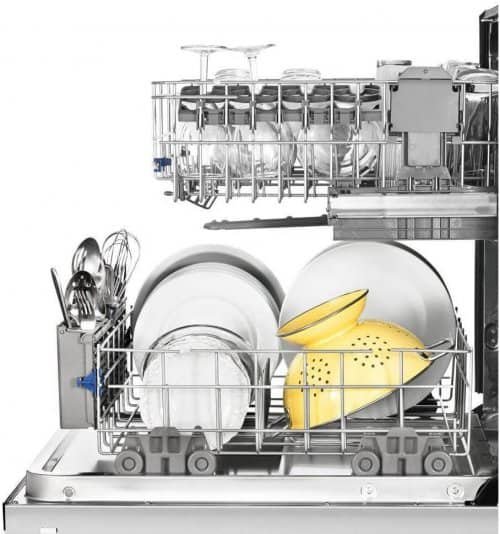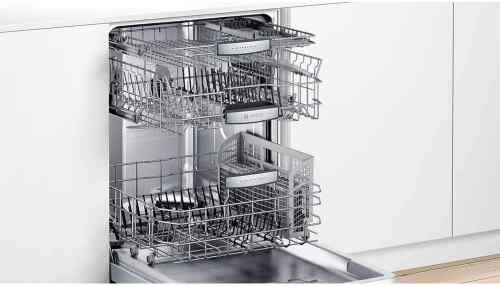Is your dishwasher leaving you with standing water at the end of a cycle? Dealing with water that refuses to drain can be frustrating and inconvenient. However, understanding the common causes and troubleshooting steps can help you resolve this issue efficiently. In this article, we will explore the reasons behind water not draining in a dishwasher and provide you with practical solutions to rectify the problem.
A dishwasher is designed to clean your dishes effectively while ensuring the water used during the cycle is drained away properly. However, several factors can disrupt this process, leading to water accumulation at the bottom of the dishwasher.
Table of Contents
Common Causes of Water Not Draining in a Dishwasher
- Clogged filter
- Blocked drain hose
- Faulty drain pump
Clogged Filter
One of the most frequent causes of water not draining in a dishwasher is a clogged filter. The filter’s primary purpose is to prevent food particles and other debris from entering the drain pump. Over time, the filter can become blocked, impeding water flow and resulting in poor drainage.
Blocked Drain Hose
Another potential culprit for inadequate drainage is a blocked or kinked drain hose. The drain hose connects the dishwasher to the sink’s plumbing system or garbage disposal unit. If the hose becomes obstructed or bent, water cannot pass through freely, leading to drainage problems.
Faulty Drain Pump
The drain pump plays a crucial role in expelling water from the dishwasher. If the pump malfunctions or fails, it will be unable to remove the water effectively. A faulty drain pump can result from a variety of issues, such as a broken impeller or motor, and will need to be repaired or replaced.

How to Troubleshoot Water Not Draining in a Dishwasher?
If you’re experiencing drainage issues with your dishwasher, here are some troubleshooting steps to follow:
- Step 1: Check the filter
- Step 2: Inspect the drain hose
- Step 3: Examine the drain pump
- Step 4: Clean the air gap (if applicable)
- Step 5: Run a vinegar cycle
Step 1: Check the Filter
Begin by locating and inspecting the dishwasher’s filter. Remove any visible debris or particles and clean the filter thoroughly. A clean filter allows for proper water flow and can significantly improve drainage performance.
Step 2: Inspect the Drain Hose
Next, examine the drain hose for any obstructions or kinks. Ensure the hose is securely connected and free from debris. If a blockage is found, carefully remove it to restore proper water flow.
Step 3: Examine the Drain Pump
Inspect the drain pump for any signs of damage or blockage. Check if the impeller is spinning freely and the motor is functioning correctly. If the drain pump is faulty, it may need to be repaired or replaced by a professional.
Step 4: Clean the Air Gap (if applicable)
Some dishwashers have an air gap installed on the sink’s countertop or nearby cabinet. This air gap prevents wastewater from flowing back into the dishwasher. If you have an air gap, clean it by removing the cap and clearing any debris inside. This can help resolve drainage issues related to the air gap.
Step 5: Run a Vinegar Cycle
Running a vinegar cycle can effectively remove residue and mineral deposits that may be hindering proper drainage. Simply place a cup of white vinegar in a dishwasher-safe container on the top rack and run a hot water cycle. This will help clean the internal components and improve drainage performance.
Preventive Measures for Proper Drainage in a Dishwasher
To maintain optimal dishwasher drainage and prevent future issues, consider the following preventive measures:
- Regularly clean the filter to remove debris and buildup.
- Avoid overloading the dishwasher, as it can impede water flow and drainage.
- Scrape off excess food from dishes before loading them into the dishwasher.
- Ensure the drain hose is correctly installed and free from kinks or blockages.
When to Seek Professional Help?
While many drainage issues can be resolved through troubleshooting, there are situations where professional assistance may be necessary. Consider contacting a qualified technician if:
- The water does not drain despite following the troubleshooting steps.
- Unusual noises or leaks accompany the drainage problem.
Professional intervention ensures that any underlying issues are addressed promptly and effectively.

Standing Water in Dishwasher?
If you are noticing standing water in your dishwasher, there could be a few potential causes. The first is that the drain hose may be clogged or kinked, preventing the water from draining out properly. To check this, make sure the hose is not kinked or blocked and that it is securely connected to both the dishwasher and the sink drain.
Another possible cause of standing water in a dishwasher is an issue with the pump motor. If this part has failed, you will need to replace it. You can test the motor by listening for a humming noise when running a cycle – if you don’t hear one, then it’s likely that this is the cause of your problem.
Finally, if neither of these options are causing your issue, it’s possible that there could be something blocking the filter screen or drain valve inside the dishwasher itself.
Why sitting water in dishwasher?
It is not recommended to leave standing water in your dishwasher for an extended period of time. This can lead to the growth of bacteria and mold, which can be harmful to your health and the health of your family. Additionally, leaving standing water in your dishwasher can damage parts of the appliance over time, leading to costly repairs.
If you notice that there is standing water in your dishwasher, it’s important to take action right away. First, check for any blockages or clogs in the drain hose or filter. If these are clear, then it’s likely that the pump needs to be replaced. It’s best to call a professional repair technician if this is the case.
In order to prevent standing water from accumulating in your dishwasher, make sure you run a cycle at least once per week and clean out any food particles from the filter after each use.
Why water in dishwasher drain?
If you notice water in your dishwasher drain, the first step is to check the dishwasher filter. It could be clogged with food particles or other debris, preventing the water from draining properly. If this is the case, it’s a relatively easy fix, just remove the filter and clean it out.
If the filter isn’t clogged, then it may be a problem with your drain hose or garbage disposal. If you have a garbage disposal, make sure it’s turned on and running properly. If not, you may need to call a plumber to take a look at it. The same goes for your drain hose—if there are any kinks or blockages in the line, they must be cleared out before water can flow freely again.
In some cases, you might also need to check for air gaps in your sink or countertop. Air gaps help prevent backflow of contaminated water into your dishwasher and can become blocked over time.
Why is my dishwasher not draining even after cleaning the filter?
While a clogged filter is a common cause of drainage issues, there may be other underlying factors such as a blocked drain hose or a faulty drain pump. Ensure you follow all the troubleshooting steps to address potential problems comprehensively.
Can I use bleach to clean the dishwasher drain?
It’s generally not recommended to use bleach for cleaning the dishwasher drain. Bleach is a harsh chemical that can damage the internal components of the dishwasher. Stick to using vinegar or dishwasher-specific cleaning agents for effective and safe cleaning.
How often should I clean the dishwasher filter?
It’s advisable to clean the dishwasher filter at least once a month. However, if you notice frequent drainage issues or heavily soiled dishes, more frequent cleaning may be necessary.
What should I do if water is leaking from my dishwasher?
If you notice water leaking from your dishwasher, it could indicate a problem with the door seal, faulty plumbing connections, or a damaged hose. It’s best to turn off the dishwasher, check for visible signs of leakage, and contact a professional technician for further assistance.
Can a clogged garbage disposal cause dishwasher drainage problems?
Yes, a clogged or malfunctioning garbage disposal can impact the dishwasher’s drainage. The dishwasher drain hose is often connected to the garbage disposal unit. If the disposal is clogged or not functioning correctly, it can impede water flow and cause drainage issues.
Conclusion
A dishwasher with water that won’t drain can be a frustrating problem, but by understanding the common causes and following the appropriate troubleshooting steps, you can resolve the issue. Regular maintenance, such as cleaning the filter and checking the drain hose, can help prevent drainage problems in the future. However, if problems persist or unusual symptoms arise, it’s best to seek professional help to ensure a reliable and efficient dishwasher.

